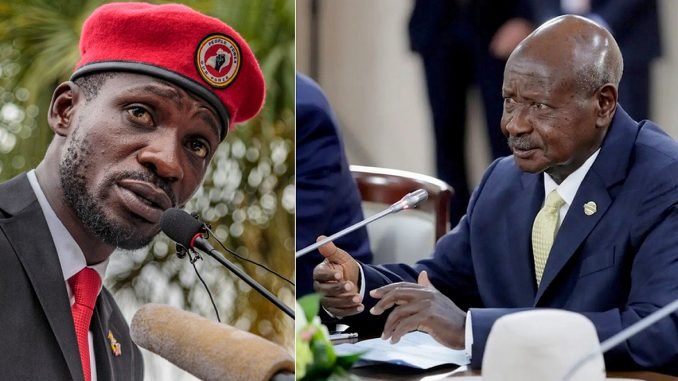
Kampala, Uganda | By Michael Wandati | Robert Kyagulanyi, leader of the National Unity Platform (NUP), popularly known as Bobi Wine, has declared his candidacy to contest against President Museveni in the upcoming 2026 elections.
However, the status of President Museveni’s participation in the 2026 elections is currently uncertain.
In a recent interview with CNN‘s international host Christiane Amanpour, Kyagulanyi highlighted the importance of a transparent electoral process, emphasizing his steadfast commitment to fostering change in Uganda.
He reiterated his unwavering determination to challenge President Museveni’s 38-year-long rule.
“My music opened my eyes and those of the masses, especially the youth, leading me into trouble. But it was good trouble. Music has always been my platform to communicate,” said Bobi Wine.
Kyagulanyi explained that his music served as a means to connect with people and played a pivotal role in influencing his decision to venture into politics.
“We will continue to challenge General Museveni through every available moral and constitutional means. By 2026, if we haven’t removed him from power, we will challenge him to a free and fair election,” Bobi Wine declared.
Resonating with the masses: Bobi Wine’s charisma and grassroots engagement
Despite acknowledging the risks of challenging a long-standing incumbent, Kyagulanyi remains unwavering in his mission. Committed to opposing Museveni’s regime through moral and constitutional means, he aims to garner international attention and support to empower Ugandans in asserting their democratic rights.
Kyagulanyi’s ultimate objective is to foster positive change, establishing a more inclusive and transparent political landscape in Uganda. The transition from a beloved musician to a political force has not only captivated the nation but has also attracted global interest.
Despite the obstacles, Kyagulanyi’s steadfast determination and commitment resonate, particularly among the youth, who see him as a beacon of hope for a brighter future in Uganda.
In addition to his political endeavors, Kyagulanyi has been a vocal advocate for human rights and social justice. His involvement in various grassroots initiatives showcases a multifaceted commitment to uplifting communities across Uganda.
Furthermore, Kyagulanyi has utilized social media platforms to connect directly with a broad audience, fostering a digital movement that amplifies his advocacy for democratic values and equality.
The charismatic leader’s ability to resonate with diverse demographics, coupled with his energetic and dynamic approach to addressing societal issues, has contributed to his widespread popularity.
As he navigates the complex political landscape, Kyagulanyi continues to engage with citizens through town hall meetings, rallies, and online platforms, building a grassroots movement that extends beyond traditional political boundaries.
Kyagulanyi’s journey from a renowned artist to a political figure embodies the evolving aspirations of Ugandan citizens, reflecting a desire for change and a more inclusive political discourse.
This transition has not only reshaped the national political landscape but has also sparked conversations on the intersection of entertainment, activism, and governance in contemporary Africa.
Decades of leadership: President Museveni’s impact on Uganda
President Museveni, with a political career spanning nearly four decades, has been a central figure in Ugandan politics. His leadership has seen both commendations for economic stability and criticisms for challenges related to governance and human rights.
Having assumed office in 1986, Museveni’s long-standing rule has positioned him as a dominant force in the country’s political landscape. His policies, such as the promotion of economic liberalization, have contributed to Uganda’s economic growth but have also faced scrutiny for issues like corruption and a perceived erosion of democratic principles.
Museveni’s administration has navigated various geopolitical challenges, including regional conflicts, making him a key player in East African affairs. As Uganda approaches the 2026 elections, the question of whether Museveni will seek re-election adds an element of suspense to the political scene.
The dynamics of Ugandan politics are evolving, with Museveni’s legacy and the nation’s aspirations for change influencing the narrative. The juxtaposition of a seasoned incumbent and emerging political figures like Kyagulanyi shapes a political landscape characterized by contrasts and the anticipation of transformative shifts.
Also Read: Museveni accuses Bobi Wine of being a fascist
In conclusion, as Uganda stands at the crossroads of its political future, the narratives of both President Museveni and Bobi Wine converge and diverge, shaping the nation’s discourse.
President Museveni’s long-standing tenure, marked by economic stability and governance challenges, presents a complex legacy that will likely play a pivotal role in the upcoming elections.
On the other hand, Bobi Wine’s journey from a beloved musician to a political force signifies a new chapter in Ugandan politics. His commitment to human rights, dynamic advocacy through social media, and grassroots engagement exemplify a changing political landscape, driven by digital connectivity and a desire for inclusive governance.
The 2026 elections loom as a crucial juncture, where Uganda will decide not only on its leadership but also on the path it wishes to tread—a continuation of established leadership or a shift towards a more diverse and dynamic political arena.
As the nation navigates this defining moment, the stories of Museveni and Kyagulanyi intertwine, reflecting the complexities and aspirations of Uganda’s political narrative.



